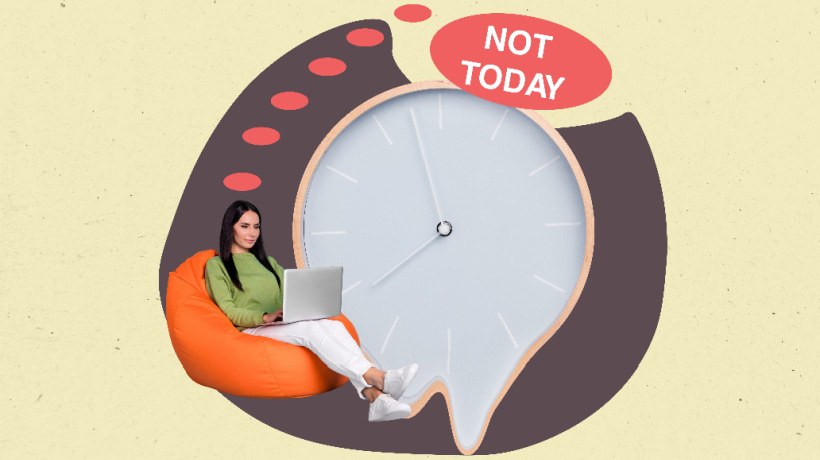The Negative Effects Of Procrastination
There are two types of procrastinators: passive and active. The former delay their tasks because they may have trouble making decisions, while the latter tend to delay their work because they operate better under pressure. Both categories experience drawbacks that keep them from bringing their A-game. For example, they might get very anxious, frustrated, and guilty regarding their lack of productivity since they often put things off until the last minute. Their confidence and self-esteem are also affected, making them feel unhappy about their overall performance. As a result, a variety of health issues may appear due to chronic procrastination, including headaches, insomnia, and digestive problems. This is why it is crucial for anyone who experiences these symptoms to tackle and stop procrastination before it takes hold of their lives.
8 Tips To Avoid Procrastination And Increase Productivity
1. Break Work Into Smaller Tasks
Multitasking is quite daunting for many, and when a project is quite big and difficult, they might lose their concentration and let procrastination take over. Breaking projects into smaller tasks will help professionals focus on one thing at a time and produce at a much higher rate. For example, if you need to write a big thesis or online presentation, start by thinking about your subject, then your title, and then write each paragraph or chapter, taking breaks in between. Setting easily achievable goals will instill confidence and prove that you can finish any project, no matter how big or small. Try not to think about the next steps and concentrate on the single task you have in front of you.
2. Recognize The Triggers
To stop procrastination, you first need to realize that you are doing it. Putting off a task for valid reasons is okay, but when you continuously leave the same task on your to-do list, you probably procrastinate. You need to address this and find out why you are avoiding this specific task. If it's an important one and you need to do it as soon as possible, putting it off may cause trouble at work and affect your productivity. Sometimes, we may avoid working on specific projects out of fear of failure and prefer to postpone them indefinitely. They may feel that they don't have the skills to complete it successfully, and they will let themselves and others down. Perfectionists are also major procrastinators at times, setting unrealistic goals for themselves that they don't feel ready to strive for.
3. Organize Tasks Effectively
Having a clear schedule goes hand in hand with breaking projects into smaller tasks and will eventually help you stop procrastination. For this step to be successful, you need to prioritize the most important tasks and treat them with greater urgency. It's good to set deadlines for all tasks and know when each must be done. This way, you know that delaying one task may jeopardize the entire project. Additionally, you may want to put the most difficult tasks in the middle of your daily schedule. As a result, you can ease yourself toward them. Make sure that you don't overfill your schedule, though. Leave some extra time for each task in case something goes wrong so that you avoid a domino effect. In workplace productivity, keeping an organized and clean Mac is a technical nicety and an important strategy to beat procrastination and boost efficiency. A clutter-free digital workspace is similar to a well-organized physical desk; it promotes a focused mindset and reduces distractions, allowing you to tackle tasks with a clear head.
4. Remove Distractions
It's hard to concentrate when your phone keeps beeping and your email tab is always open. Some also find it very easy to lose focus thanks to the bookmarks on their computer browser. Whatever your distractions are, you must locate and eliminate them. You may need to turn off the TV and instead listen to classical music. Deactivate your social media for a while and keep only the necessary tabs open. You can even try the Pomodoro technique. You can work for 25 minutes at a time and take a 5-minute break before repeating the cycle. This way, your brain knows when it'll get a timeout and can concentrate more efficiently.
5. Change Your Environment
The environment we work in can elevate or diminish our productivity. Procrastinators may lose sight of the goal when their desk is full of decorative elements and there's hardly any space to spread their material. So, make sure that your desk has only the necessary tools and lots of space to put all your work necessities. Also, you may need to reconsider your working location. If loud spaces don't work for you, consider avoiding working in cafés and other public spaces. Opt for a quiet location, like a library, where noise is not allowed, phones have to be turned off, and distractions are diminished. If you need to work from home, choose a sparsely decorated spot that is not too dark.
6. Get A Motivation Buddy
To stop procrastination, it may be helpful to find a motivational buddy or accountability partner. This person can be someone who knows your goals and is honest and supportive. They must encourage you to achieve your goals and regularly check in on your progress. You can set deadlines together and be open about your struggles. You should view them as a mentor; they can be a friend, coworker, or trusted family member. Don't forget that you will also need to support and help the other person. They also have goals they need to achieve, and you will need to offer words of wisdom and advice as you see fit.
7. Forgive And Reward Yourself
Often, people are very hard on themselves and don't recognize their improvement. They focus too much on their mistakes and have difficulty accepting forgiveness. Research has found that those who choose self-forgiveness are 65% more motivated to work harder and achieve more significant results. It's easy to beat yourself up for procrastinating and being lazy, but give yourself a break and acknowledge how difficult the situation is for you. Additionally, try and reward yourself after completing a tough project. Stopping your procrastinating tendencies is a long road and takes a lot of discipline and self-control. So, when you have finally done this, indulge in a little pat on the back and treat yourself to something you wouldn't enjoy otherwise.
8. Take Care Of Your Health
Procrastinators tend to be judgmental of themselves, which is not beneficial. They need to practice self-compassion by showing kindness, patience, and understanding to themselves. It's easy to get stuck in a vicious cycle of negative thinking and self-doubt, but give yourself a break. Things don't always go as planned, and we can't control everything. Try to stay positive and interrupt yourself when you go into negative thinking. Physical exercise will help you distance yourself from a situation and clear your head. You can choose activities you find interesting and stick to them. Maybe a workout partner will help you stay committed to exercising and remove any feelings of loneliness.
Conclusion
Bear in mind that avoiding and stopping procrastination won't happen overnight, and resilience is key. Dedication, hard work, and a growth mindset will help us become better versions of ourselves. Organizations can also provide their employees with ongoing support and training resources to instill self-confidence and bridge gaps discreetly.








